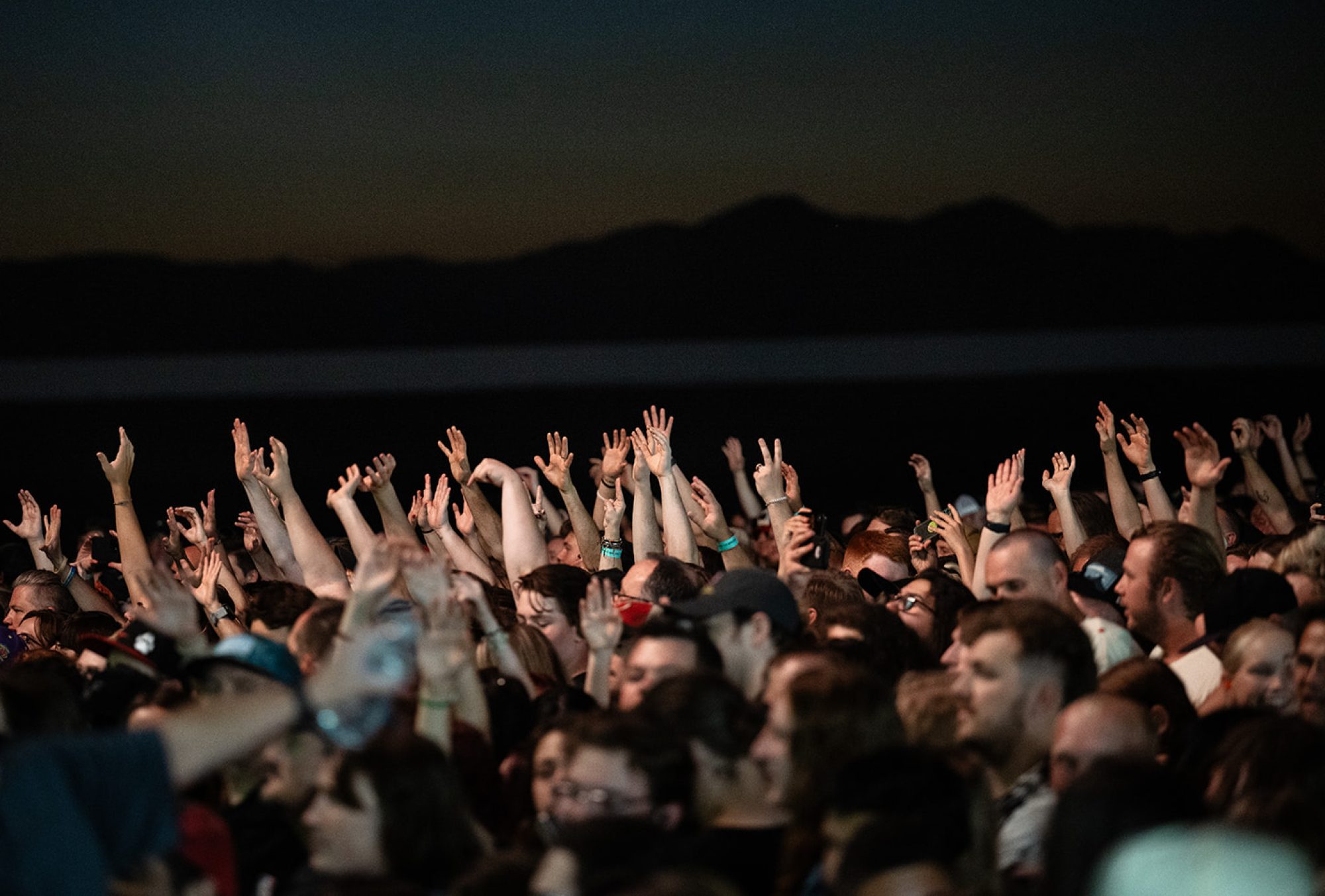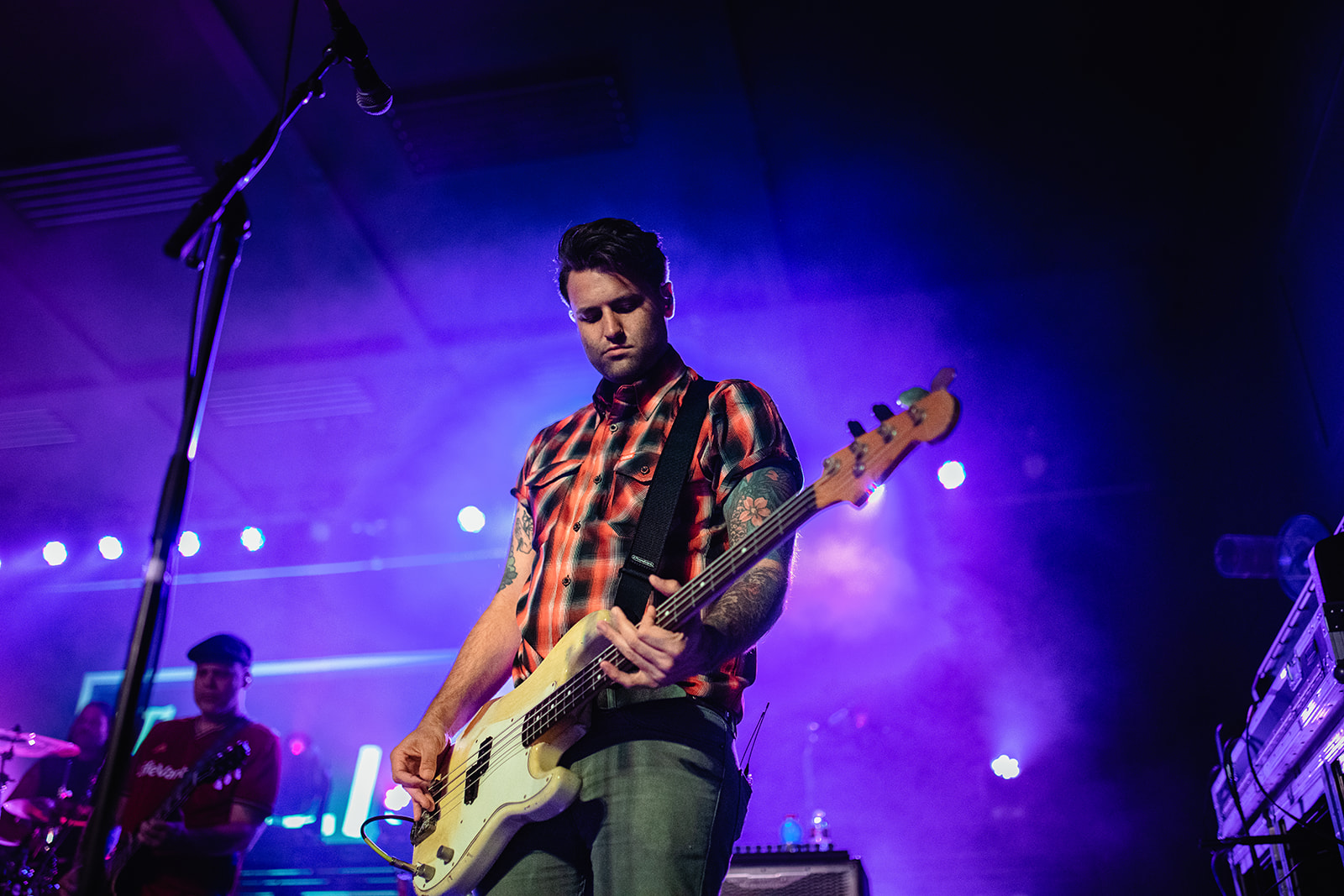Alex Levine of The Gaslight Anthem
The Gaslight Anthem will be playing at The Union Event Center on July 27, 2024. We had the opportunity to speak with bassist, Alex Levine leading up to the show. We discussed the band’s extensive career and reminisced about the last time The Gaslight Anthem played Utah. Where lead vocalist, Brian Fallon lost his voice due to illness. Enjoy!
Interviewed by Kevin Rolfe
Utah Concert Review: Before we talk about the show coming up, I’m not sure if you remember, but the last show you played here a couple of years ago was very memorable for us because Brian (Fallon lead singer) lost his voice. I don’t know if he was sick or exactly what happened, but do you have any memories of that concert?
Alex Levine: Yeah. Oh, man. I remember he woke up with a fever that morning, and it’s weird. Brian over the 20-something years I’ve been playing music with him, the guy is a freak of nature when it comes to his voice. Nothing will mess with that guy’s voice unless he’s sick. To a point where he could be sick and everything’s fine, and then all of a sudden there’s a point where it transitions, and then nothing comes out.
I remember that show really well. He was super sick. We had to cancel the following show the next night. And then yeah, I remember he just stayed in the hotel for 24 hours and we just kept cruising along. I can’t believe that was like two years ago already, right?
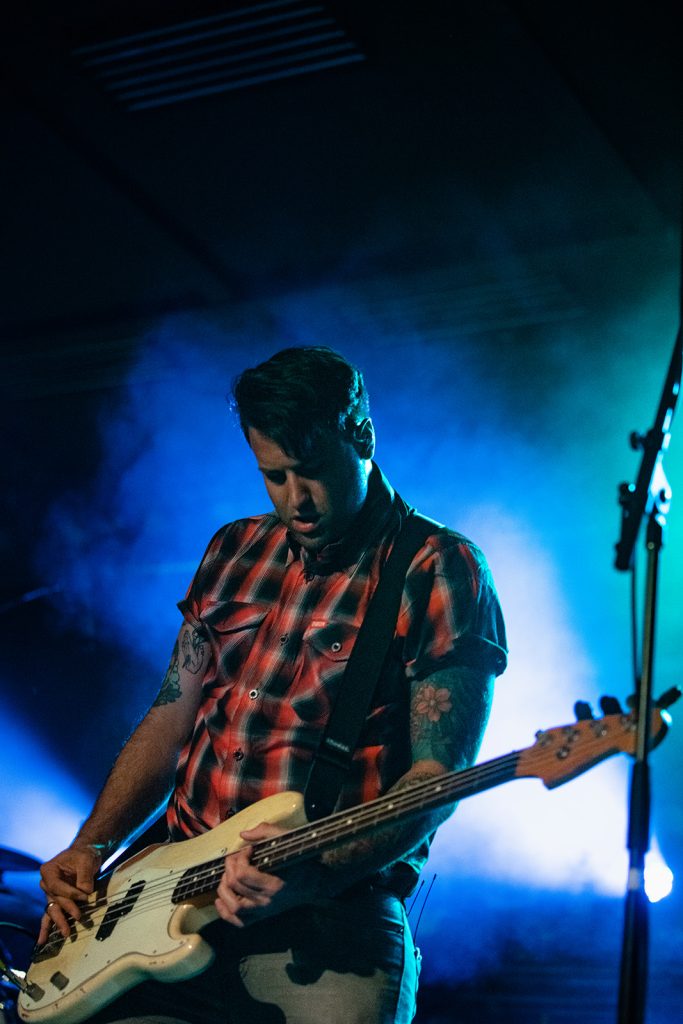
UCR: It was. The crowd was really understanding. There’s nothing you can do. But I think they really appreciated the effort and you could just feel the earnestness of him wanting to give it a go. I think he even said something like, “Do you want me to reschedule this? Do you want us to come back?” Is there a different rush that comes from that? Where you’re like, All right, let’s just see what we can piece together here to give these guys?
AL: We’ve been playing together for so long. So we kind of know how to go about situations like that. And also, like Brian, he’s a trooper when it comes to stuff like that. Honestly, it will always boil down to like, where we come from, just the punk rock way of doing things where we’re like, all right, take the business side of out of it, take like the managers and the f*¢king booking agents, all this crap. And we’re like, wait a second, we’re just sitting here playing music to people that enjoy our music. So it’s just us like, let’s just do this together and have some kind of memorable night. Because we’re sitting here talking about two years later.
There are not many shows, even if it is a great show, somewhere it goes into the Rolodex, so it becomes memorable, for one reason or another. And I think, for us we’re always, for better or worse, we’re always going to take the harder route and to be there for the people that enjoy our music.
UCR: And this was totally that type of show that stays in a fan’s memory. One of those, “Remember that time we were at the Gaslight Anthem? And Brian was sick, but he still went for it. That was so awesome!”
AL: Conversations like this, continuously put into perspective the hard traveling and being away from your kids and all of that in perspective of like, what we’ve accomplished what we do, and what this whole thing really is, that we could go back to Utah and our fan base in Utah has a time capsule of like a certain show that is a string of shows for us over the last couple years. But you go back and you’re like, wait a second, this matters to people. It matters to us. So this time around, let’s do the best we possibly can to make a better memory.
UCR: do you recall not even just Utah, but name any place where it’s like, “Well, we’re going to play this place. We don’t know anyone there personally, but there’s going to be a crowd there to hear our music. Do you remember that feeling or the sensation of that?
AL: So it’s funny. Actually, I have a really crazy, like photographic memory. I remember times and dates. It scares me sometimes. I remember the first time we played Utah. It was 2007 and we were on tour with this band Signal to Noise. And we played at this place that was like a barn. There were some DIY punk shows there. And Salt Lake City was one of those shows. It was like Denver, Salt Lake. Then we popped up to like Portland and whatnot. And it was those first string of shows when we did this tour, where there were just like five to 10 to 15 people that were coming out. And we had no idea how they even knew what the band was. We had one record out.
And those places, it kind of stuck in my mind, especially Salt Lake, because we went back to Salt Lake pretty frequently. Like soon after, we would always play this bar. I remember we played it like three or four times. And then every single time, by the time you know, 2010 rolled around, it was completely sold out. And we’re like, wow, Salt Lake City is like a legit, legit place, a legit market for us.
UCR: That’s so awesome. I’m sure that has to be an amazing feeling.
AL: It’s just something that will never leave you. And I’ve seen it with some bands where they do lose touch of that. Then on the flip side, I guess, just expect it, right? And I think for us, because we’ve, you know, we never had like a, like a hit or anything like that. We’ve had some success with a few songs here and there, but nothing where, where you’re going to walk down the street and someone’s like, that’s The Gaslight Anthem, or that’s that song. We’ve consistently built a fan base that cares, and relates to our music in a way that some bands just will never have. And I’ll take that any day of the week over a big radio hit that is whatever, you know?
UCR: I feel like with music careers, there are certain crossroads. This road could have taken you one way this way another direction and maybe on that end of that road is a cliff to the \ end of your career. Right? Have you seen those paths where maybe you’re being pulled in a direction that you’re not necessarily wanting to go, but it has the potential to be more lucrative or there’s mainstream success? Has it been difficult to maintain your musical integrity, while also wanting to maintain a career in music?
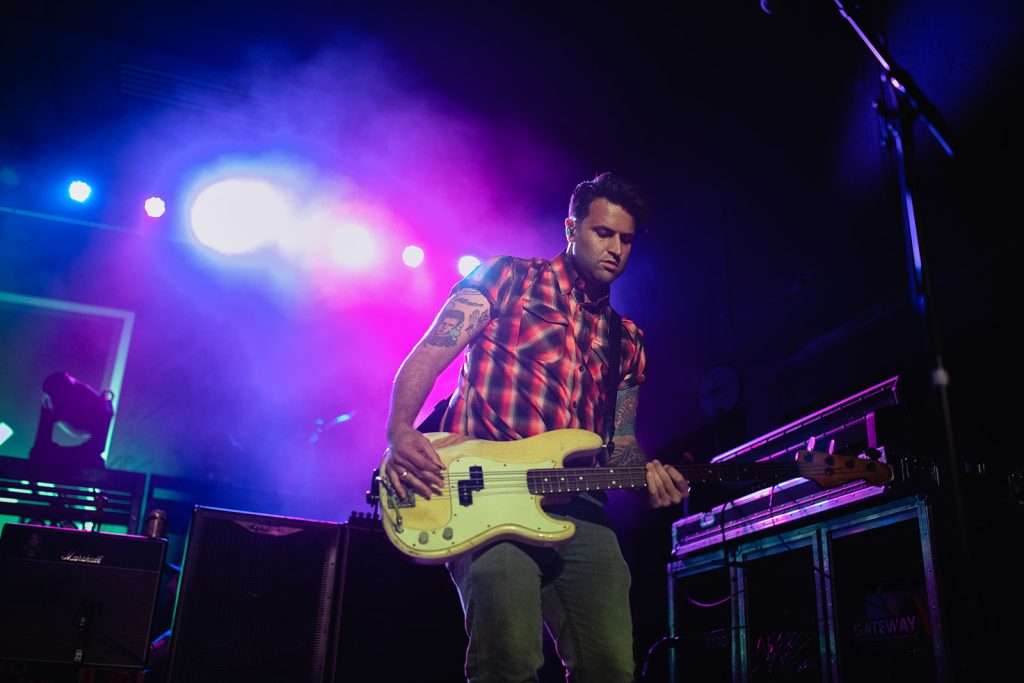
AL: It’s difficult in this business to have that perspective while it’s happening, right? I think for us, it was a bunch of punk kids that put a record out. Nothing really happened. We were touring or whatever it was back in like, 06 or 07. And then there was this buzz. And it was one thing after another, after another, after another happened. All of a sudden, we found ourselves, with recording 59 Sound, and then signing with Sidewind Dummy. There was this intangible feeling, I remember all of us would say, there was something that was moving us. That was not that that wasn’t us.
So we were like, “Alright, let’s just jump on and see where this takes us.” Over that period of time, when you’re looking at the day-to-day of it, there’s different pressures that are happening. You think you’re doing what’s best for the band or the career at that time.
I remember doing American Slang. And we were like, oh, man, there’s this other pressure now, because now there are people that actually care about this band a little bit. So what’s gonna happen, if we put something out, nobody likes it, right? I think for the band, you’re concentrated on those little details that are within, while, for the first time having a manager and agent and all of that come on board. At that time, we never had that. So you don’t really know who’s pulling what or what conversations are being had on your behalf. And as the years have gone on, you get hip to what happens on that side of the coin. And you’re like, Nope. I know that this guy’s going this way, we’re going this way, it’s never gonna work.
I think we, you know, at this point, our career, and our lives, like we figured out, at least for now, like what we’re after. And what we’re after is pretty simple. Just to maintain a career and make music, right? And it sounds simple, but there’s a lot of different things. You hear about the Live Nation stuff and all of these crazy things that are making the music business go one way or another. And we’re like, listen, as long as we just write the music that we want to write, and play the shows that we want to play, and do our best in terms of rehearse and put a good show forward.
Theoretically, we should be able to play to the people that like our music, right? And I think that’s really what, what is a liberating idea for us now, because we don’t, we don’t need all the other stuff. If all the other stuff happens, great. But at our point in our career now, we’ll know how to deal with that a lot better than we would have 10, 15 years ago.
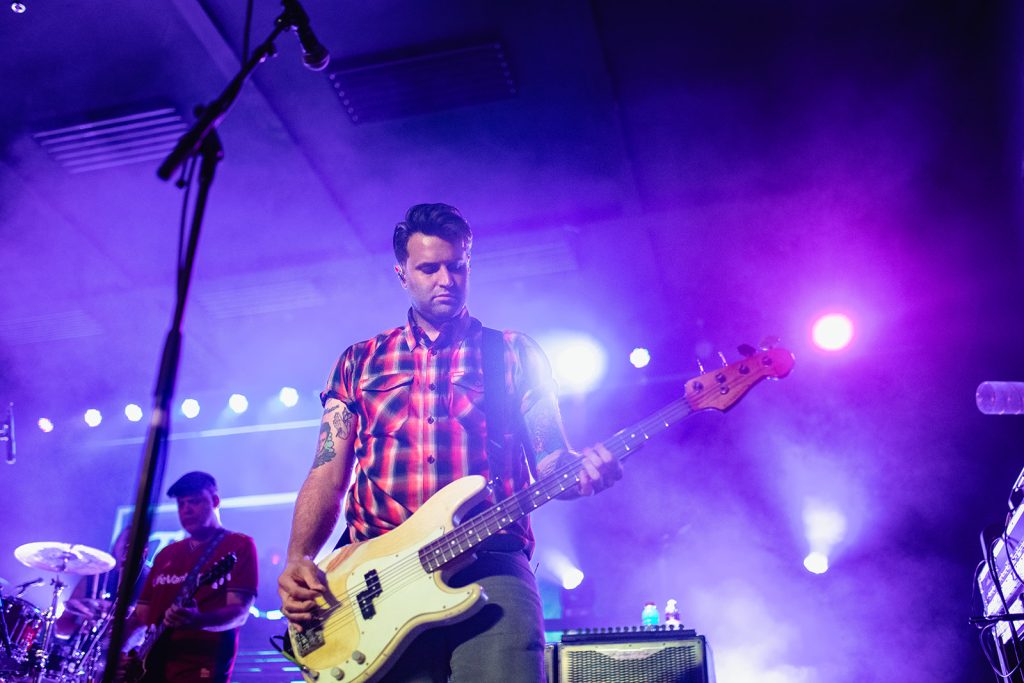
UCR: So I’m interested in what your fans can expect from this tour. How do you decide, really, I guess, on how to form the setlist when you have a new album come out?
AL: At this point, we have anchors in our set that we will have no matter what. And then we’re pretty loose with that, to be honest. As you know, we change the set list pretty much every night.
Right now we have about 50 songs that we’re pulling from. I think organically, what we try doing is we’ll have a mix. We look at a lot of the comments online, and we see what is trending more so in one city or another, whether it’s more 59 Sound or more of the later stuff, or somewhere in between. And, and we do that.
And with the newer stuff, we try to keep it to like, maybe four new songs, and we spread them out throughout the set. Because personally, I hate being bombarded with new music when you’re just trying to see the band that you like. And then with our covers, we’ll try to incorporate one or two covers that we’ve never done before. And that’s pretty exclusive to that tour.
UCR: Best of luck on the rest of the tour. We look forward to having you guys back in Utah.
AL: Killer, bro. See you on Saturday. Take care, buddy.
For tickets to The Gaslight Anthem at The Union Events Center click here!
